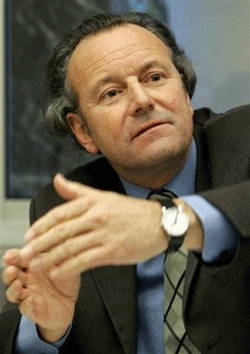|
Panel pushes probe of Oil-For-Food Program
(AP)
Updated: 2005-12-17 10:16
PARIS - An anti-bribery panel urged governments Friday to do more to
investigate evidence of kickbacks and corruption in the U.N.-commissioned report
on Iraq's oil-for-food program.

OECD's anti-bribery panel chairman
Mark Pieth, of Switzerland, presents his report to urge governments to do
more to investigate evidence of kickbacks and corruption in the U.N.
commissioned report on the Iraq oil-for-food program, at the OECD
headquarters in Paris, Friday Dec. 16, 2005. [AP] |
|
Only 11 of some 40 countries whose citizens or companies were
implicated by the inquiry have requested the evidence unearthed with a view to
possible prosecutions, said Mark Pieth, panel chairman at the Organization for
Economic Cooperation and Development.
"The working group encourages its members to follow up by
obtaining this information," said Pieth, who also was a member of the
independent inquiry headed by former U.S. Federal Reserve Chairman Paul Volcker.
The United States and France have begun their own criminal probes into
possible sanctions busting and bribery. Pieth declined to identify the nine
other countries whose authorities have requested access to the Volcker inquiry
evidence.
An official close to the investigation said the nine other governments that
sought additional information were Australia, Britain, Switzerland, India,
Italy, Germany, Thailand, Jordan, and Sweden. The official spoke on condition of
anonymity because the names of the countries have not been released.
Many of the states most implicated by the report's findings, such as Russia,
China, Vietnam and Thailand, are neither OECD members nor signatories to a
broader 1997 anti-bribery convention.
Pieth spoke at the end of a three-day meeting of the organization's bribery
and corruption working group. The panel is responsible for monitoring
enforcement of the 36-country convention, which requires corruption by foreign
public officials to be treated as a criminal offense.
In its Oct. 27 final report, Volcker's 18-month inquiry into the U.N.'s Iraq
oil-for-food program identified kickbacks and other illicit payments totaling
$1.8 billion, as well as evidence of involvement of about half the 4,500
participating companies.
Besides payments made to Saddam Hussein's regime in breach of international
sanctions, some 270 individuals �� including a long list of well-known
politicians in several countries �� appear to have received lucrative oil
"vouchers" from the Iraqi Oil Ministry.
Although prosecutors can consult the catalog of evidence gathered by
Volcker's Independent Inquiry Committee, they have to reapply for its disclosure
by the authorities in the country of origin before it can be used in court. Bank
account details, for example, "are protected by client confidentiality in most
cases," Pieth said.
Meanwhile, Louise Frechette, the U.N.'s first deputy secretary-general who
was strongly criticized for tolerating corruption in the oil-for-food program,
will join the Center for International Governance Innovation, a leading Canadian
international relations and policy research center, in April, the center
announced Friday. A U.N. official confirmed that Frechette would be leaving the
world body at that time.
|